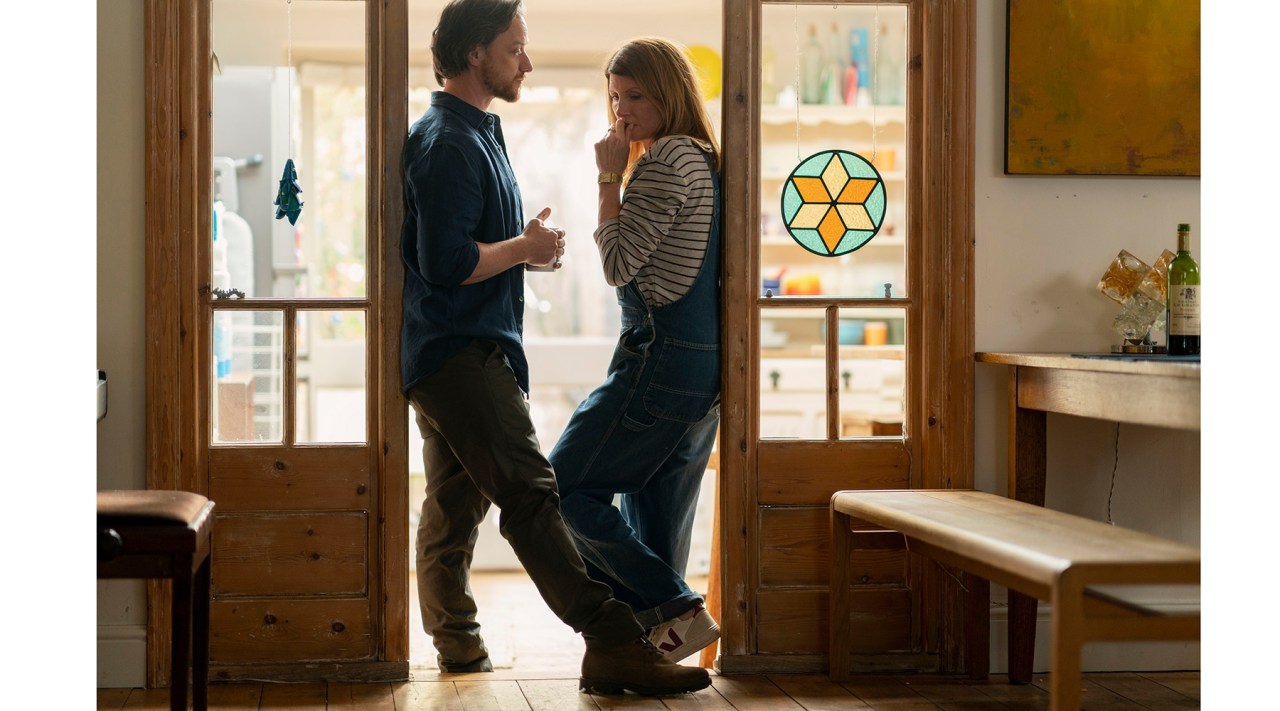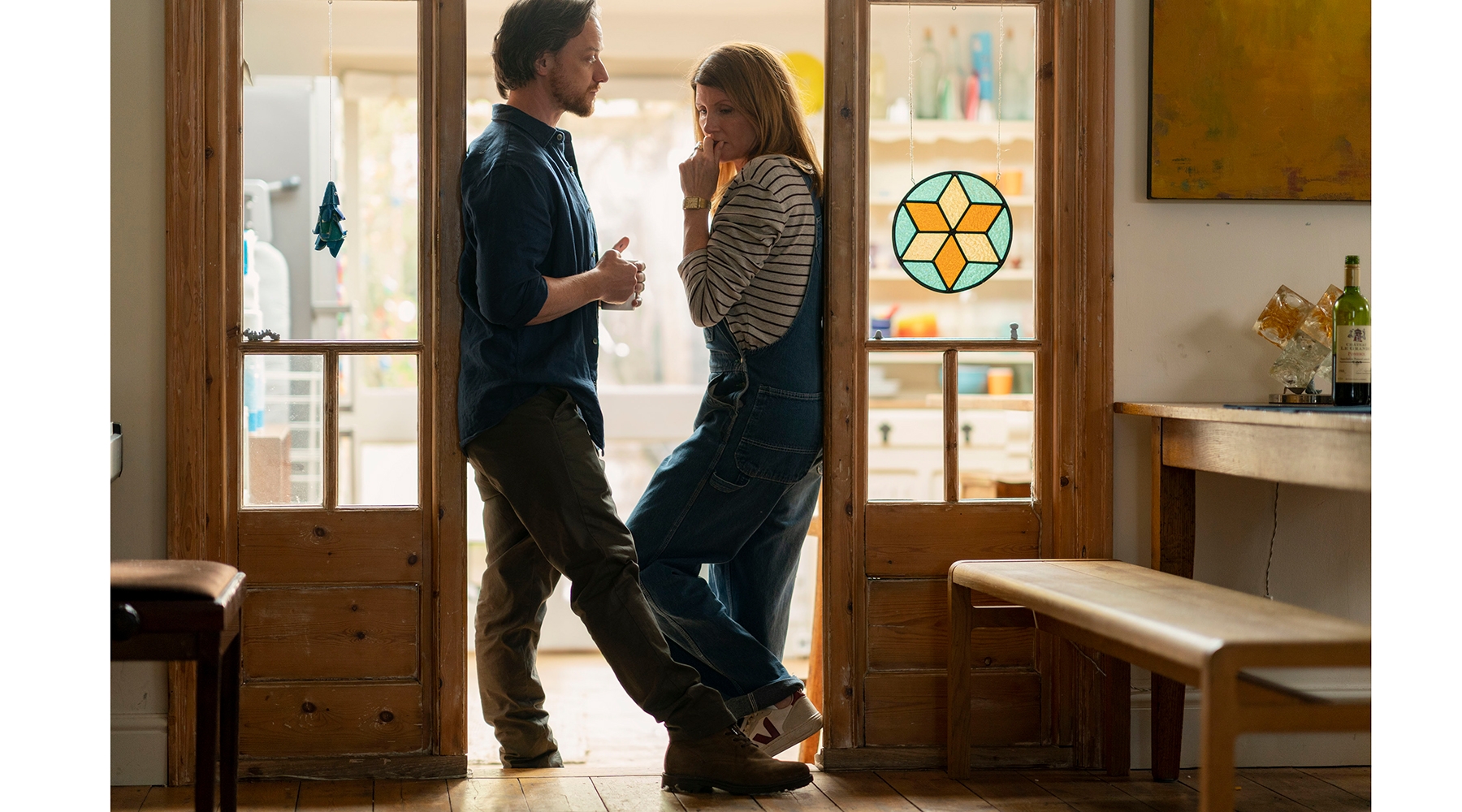Let me start with a spot of admin: if you’re wondering what The Speccie makes of GB News, it’ll be reviewed next week once the channel’s had a fair chance to establish itself. In the meantime BBC2’s Together took an impeccably up-to-date subject and gave it surprisingly old-fashioned treatment — by returning us to the far-off days when TV drama had its roots in theatre rather than cinema. Not only was it a 90-minute two-hander, but the characters spoke to both each other and the audience on a single set.
Sharon Horgan and James McAvoy played an unnamed couple (always a bit annoying for a reviewer but I won’t let that affect my steely objectivity) who entered the first Covid lockdown convinced of the fact that they hated each other. ‘I actually think of him as a cancer,’ the woman told us. ‘One of the really bad ones.’ ‘The only thing keeping us together is little Artie,’ the man pointed out — although even their son’s name was a matter of bitter dispute, with her passionately preferring ‘Arthur’.
Of course, back in happier times ‘we have absolutely nothing in common’ was cheerfully glossed as ‘opposites attract’. Now, the contrast between his working-class entrepreneurship and her middle-class liberalism had become just one more way for them to stereotype each other. So how would they get on once they were banged up together for the duration? The answer is that, somewhat to their embarrassment, they began to remember some of the reasons for their former fondness.
Together returned us to the far-off days when television had its roots in theatre rather than cinema
Thursday’s drama duly traced this hesitant remembering as any well-made stage play would. Which is to say that it could occasionally be over-schematic but on the whole it kept our sympathies shifting efficiently from one partner to the other until they finally settled on both. Dennis Kelly’s darkly witty script also benefited hugely from Horgan and McEvoy’s brilliant, naturalistic performances, which covered up all but the creakiest of moments. (The man’s boastful account of humiliating a shop worker in the first week of lockdown may have been a handy signifier of non-liberalism, but it felt distinctly implausible coming from a fundamentally decent bloke.)
Like any well-made play too, Together used a very particular experience to illuminate wider social issues. In April 2020, the woman (see what I mean about unnamed characters being annoying?) was delighted that her sister had managed to persuade their old mum into a care home — adding with much relief, and even more dramatic irony, that ‘She’ll be safe in there’. A month later, she was called into hospital to make the permitted 15-minute farewell, in full protective equipment, before leaving her mother to die alone. This led in turn to a renewed reliance on her husband for emotional support, and to a straight author’s-message monologue laying out with chilling precision the process by which Covid patients were ‘dumped’ in care homes ‘like blankets laced with smallpox’.
Where the author seemed understandably less certain is on what will happen next. Will we really have lasting respect for the unexpectedly important people (such as that humiliated shop worker) who kept us all going? Or will we only know we’re back to normal when we don’t notice them any more?
By the time we find out, Covid will presumably have featured in plenty more TV dramas, not least the one recently announced by Sky with Kenneth Branagh as Boris Johnson. Meanwhile, Together ultimately proved well made enough to take its place alongside Staged as one of the best so far.
Sunday brought us the second part of Jimmy McGovern’s Time on BBC1. For my money, McGovern can sometimes wear his big old Scouse heart a little too bleedingly on his sleeve. Here, however, he’s pretty much at his best: packing genuine emotional punch, but with the points he wants to make seeming to emerge from the characters and plot instead of being imposed upon them.
It doesn’t harm the programme’s impact, either, that it so unsparingly depicts an archetypal nightmare in which a middle-class person — in this case, ex-teacher Mark played by Sean Bean — ends up in prison where he’s completely unsuited for the violence closing in on him. (And, needless to say, if he grasses on the bullies that violence will only grow more imaginative.) Mark’s apparent lack of moral choice is also reflected in the plight of the warder Eric who’s being forced by a group of particularly scary prisoners to smuggle in drugs or his son in another jail will be badly beaten up.
Time doesn’t leave us in much doubt about the shortcomings of the prison system: the understaffing, the prevalence of self-harm, the scores of inmates who should be in mental hospitals. Now and again, it even throws in some much-needed moments of human tenderness, mostly from the lovely prison chaplain (Siobhan Finneran). Nonetheless, the main source of the programme’s considerable power remains its portrayal of terrifying existential helplessness.







Comments